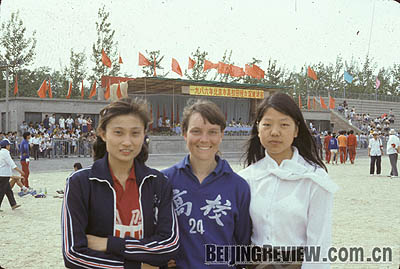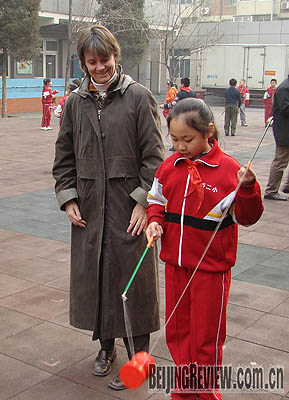|

COLLEGE DAYS: Susan Brownell (center) poses for a photo with two fellow heptathletes at Beijing College Students’ Games in 1986, where she won a gold medal in heptathlon (COURTESY OF SUSAN BROWNELL)
Susan Brownell, an anthropology professor at the University of Missouri, St. Louis, guesses she might have been the only non-Chinese person crying in front of their TV when Beijing lost its bid for the 2000 Summer Olympics to Sydney by two votes on September 23, 1993.
"I remember watching the broadcast on TV and when China lost the bid and I had tears in my eyes, because I lost my chance for a job," said the 47-year-old anthropologist.
At that time, Brownell who received her Ph.D. in 1990, was in discussion with the Atlanta Olympic Organizing Committee over working as its liaison in Beijing if China won the bid for the 2000 Olympic Games. Her qualification for this job included her excellent command of Chinese, her doctorate studies on the Chinese sports system and her personal experience of representing Beijing in the 1986 Chinese National College Games, pocketing one gold medal in the heptathlon and two silvers in relay events.
Ever since the Virginia native came to China for the first time to do dissertation research in 1984, her life has been closely linked with Chinese sports, as an athlete, researcher, author and adviser.
When China first bid to host the 2000 Olympic Games in 1993, she was interviewed for a promotional film that aired overseas. When China's second bid came to the final stage in January 2001, Brownell came to Beijing at the invitation of Beijing Sport University to give her suggestions on China's bid and met with Liu Jingmin and He Zhenliang, top officials of the Beijing 2008 Olympic Bid Committee. Shortly before the voting on the 2008 Olympic Games bid took place, she was invited to a broadcast debate on All Things Considered, an influential news program on National Public Radio in the United States, during which she stood by Beijing to host the Games.
She recently translated the biography of He Zhenliang, a Chinese member of the International Olympic Committee (IOC) and China's "Mr. Olympics."
On sabbatical during the 2007-08 academic year, Brownell has spent the year as a Fulbright scholar at Beijing Sport University, doing research on Olympic education in primary schools, secondary schools and universities and affiliated teacher training programs and volunteers training programs in China. She is also on a panel of experts that provides feedback on the language training program for Beijing Olympic volunteers.
In February, Beijing's Games: What the Olympics Mean to China, Brownell's new book and her second book on Chinese sports system, came out. Brownell says the purpose of the book is to tell people why hosting the Olympic Games is so important to China and to talk about whether the Olympics will change China and if China will change the Olympics.

ANCIENT SPORT: Susan Brownell learns how to play with a kongzhu, a toy known as the Chinese yo-yo and invented 1,700 years ago, during her visit to an Olympic education model school in Beijing’s Daxing District (COURTESY OF SUSAN BROWNELL)
Brownell believes that hosting the Olympic Games will help China to understand the outside world better and vice versa. The reason she chose to study Olympic education for her Fulbright program is that she believes it as an important way that Chinese people are learning new knowledge about the outside world.
As for the over 21,000 accredited journalist that will come to Beijing to report on the Olympic Games, Brownell worries that they will repeat old negative stereotypes. "Hopefully, they will start turning to other topics and they will give a broader perspective on China. Beijing organizers have to help them find other topics and have to make it easy for them to do research and report," she said.
As for how China's hosting the Olympics will change the Olympic movement, Brownell expects it to help to change the balance of power in international sports by giving Chinese culture or Asian culture a bigger place.
In her new book, one chapter is dedicated to martial arts and Olympic sports, where she challenges the generalization that China does not have a sports history, a criticism used to reduce China's sports success to nothing more than a "medal factory." This chapter explores the traditions of horse racing and wrestling in many dynasties in Chinese history and concludes that, "China has been written out of sports history." When Beijing won the right to host the 2008 Games, proponents wanted martial arts, one of the traditional sports in China, to be listed as an official Olympic sport for the home games. The IOC turned down the proposal and finally agreed it to be a representation sport.
"Western academics have written almost nothing about Chinese sports, because they didn't believe China has a sports tradition. China has its own sporting tradition, different from the West, but also ancient traditions," Brownell said.
Brownell is also against the view that China's sports system is completely medal-driven. She said China's system is not much different from the U.S. system when it comes to the pursuit for medals and pains for children athletes, only China's system is government-funded and more centralized. Explaining the multiple purposes China's sports system has served, Brownell said, "The system also trains people who will retire and become coaches, open their own sports clubs and become P.E. teachers. So it also feeds people back into the society who help to improve the general level of sports and recreation in Chinese society."
Although Brownell is pessimistic about the Beijing Olympics' impact on changing Western domination of the international sports world, she hopes the Games can help push a few Chinese into more important positions in international sports organizations, which could be one step forward in this slow process.
Will the Olympics Change China, or Will China Change the Olympics?
"Chinese culture places a great emphasis on respect for the dignity of people and nations. There is a highly refined protocol between a host and a guest; this also extends to Chinese conventions for the expression of mutual respect between states, which historically was more highly developed than that of the West. As was seen in the previous chapter, in 1996 the Chinese audience in the United States interpreted Bob Costas's comments about China in the opening ceremonies as the host country criticizing its guest. Negative media reporting during the Games will probably make some Chinese people angry because it is as if a host invited a guest to his home and the guest then criticized the host. In the Chinese tradition, host-guest meetings are highly ritualized, and are not supposed to be occasions for straightforward debate.
(Excerpts from Beijing's Games: What the Olympics Mean to China)
NOTE:
Bob Costas is an American sportscaster on the air for the NBC network since the early 1980s.
Coubertin is best known as the founder of the International Olympic Committee.
|